KOMPAS.com – Reason Why are China and Taiwan hostile? can be divided into three, namely the root of the conflict, the status of the country/region, and the relationship between the two parties.
China views Taiwan as a breakaway province and wants to retake it by force if necessary, whereas Taiwanese consider their self-governing island a separate state.
The reason why China and Taiwan became enemies can also be traced to the Chinese Civil War (1927-1949), which ended with Chiang Kai-shek’s Nationalist Kuomintang (KMT) troops fleeing to islands across the Taiwan Strait, and establishing the Republic of China (ROC).
Now with a growing population, Taiwanese people consider their territory a democracy, regardless of whether its independence is officially declared or not.
Read also: Chronology of the Causes of the Chinese Civil War
Quoted from BBC (3/8/2022), here are three factors why China and Taiwan are enemies.
1. The root of the conflict why China and Taiwan are enemies
The island appears to first appear in Chinese records in AD 239 when an emperor sent an expeditionary force to explore the area.
This is what Beijing then uses to support its territorial claims.
After a relatively short Dutch occupation (1624-1661), Taiwan was ruled by China’s Qing dynasty from 1683 to 1895.
Since the 17th century, large numbers of migrants began arriving from China, often fleeing chaos or hardship.
Most of them were Hoklo Chinese from Fujian (Fukien) or Chinese Hakka provinces, mostly from Guangdong.
The descendants of these two migrations are now the largest demographic group in Taiwan.
In 1895, Japan won the First Sino-Japanese War and the Qing Government had to cede Taiwan to Japan.
However, after World War II, Japan surrendered and relinquished control of the territory it had taken from China.
The Republic of China as one of the victors of the war finally began to rule Taiwan with the approval of its allies, namely the United States (US) and Britain.
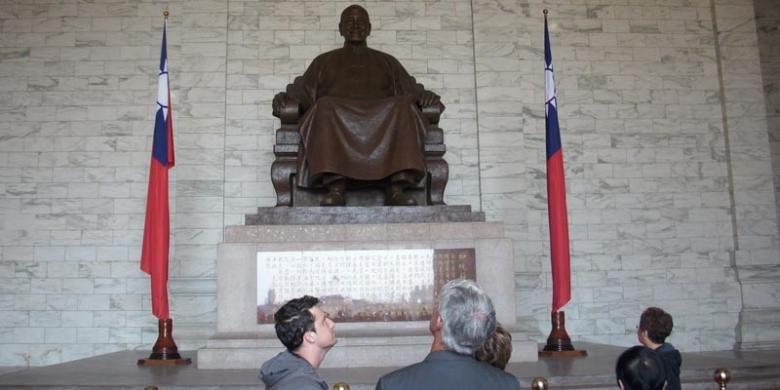 Chiang Kai-shek Memorial Hall di Taipei, Taiwan.-However, in the following years the Chinese Civil War broke out, and Chiang Kai-shek’s army was defeated by Mao Zedong’s Communist army.
Chiang Kai-shek Memorial Hall di Taipei, Taiwan.-However, in the following years the Chinese Civil War broke out, and Chiang Kai-shek’s army was defeated by Mao Zedong’s Communist army.
Read also: Chinese Civil War: The Way of the Battle and the Founding of the PRC
Chiang Kai-shek and the remnants of the Kuomintang (KMT) government and their supporters numbering around 1.5 million people fled to Taiwan in 1949.
This group of so-called Mainland Chinese dominated Taiwanese politics for many years despite only accounting for 14 percent of the population. Chiang Kai-shek then established a government in Taiwan which he led for 25 years.
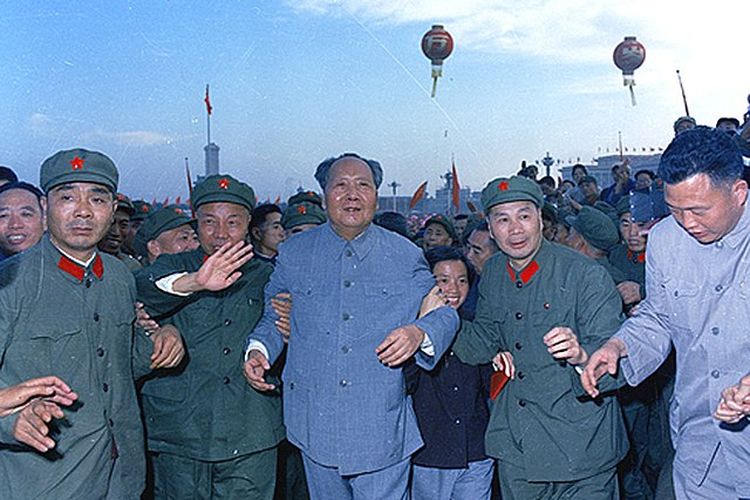 Mao Zedong’s cultural revolution.-Chiang Kai-shek’s son Chiang Ching-kuo later allowed more democratization after coming to power. He met resistance from local people who resented authoritarian rule and was under pressure from the growing democracy movement.
Mao Zedong’s cultural revolution.-Chiang Kai-shek’s son Chiang Ching-kuo later allowed more democratization after coming to power. He met resistance from local people who resented authoritarian rule and was under pressure from the growing democracy movement.
Subsequently, President Lee Teng-hui, known as the Father of Taiwan Democracy, led constitutional changes, which eventually paved the way for the election of the island’s first non-KMT president, Chen Shui-bian, in 2000.
China hates Lee Teng-hui so much because he often declares Taiwan an independent country.
2. The reason why China and Taiwan are enemies of the country’s status factor
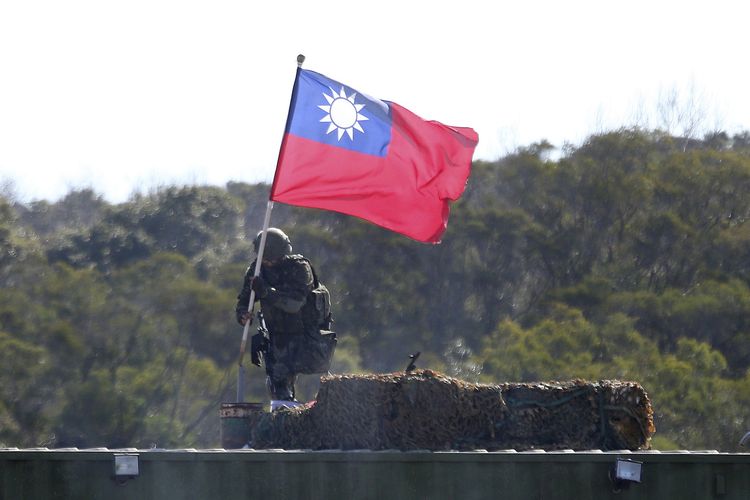 This January 19, 2021 photo shows a soldier holding a Taiwanese flag during a military exercise to ward off Chinese attacks, in Hsinchu, northern Taiwan.-There is no agreement on the status of Taiwan, whether it is recognized as a country or not.
This January 19, 2021 photo shows a soldier holding a Taiwanese flag during a military exercise to ward off Chinese attacks, in Hsinchu, northern Taiwan.-There is no agreement on the status of Taiwan, whether it is recognized as a country or not.
Taiwan has its own constitution, democratically elected leaders, and has about 300,000 active soldiers in the armed forces.
Chiang Kai-shek’s claims originally represented all of China that he wanted to re-occupy. Taiwan had occupied China’s seat on the UN Security Council and was recognized by many Western countries as the sole government of China.
However, in the 1970s several countries began to argue that the Taipei Government could no longer be considered a true representative of the hundreds of millions of people living in mainland China.
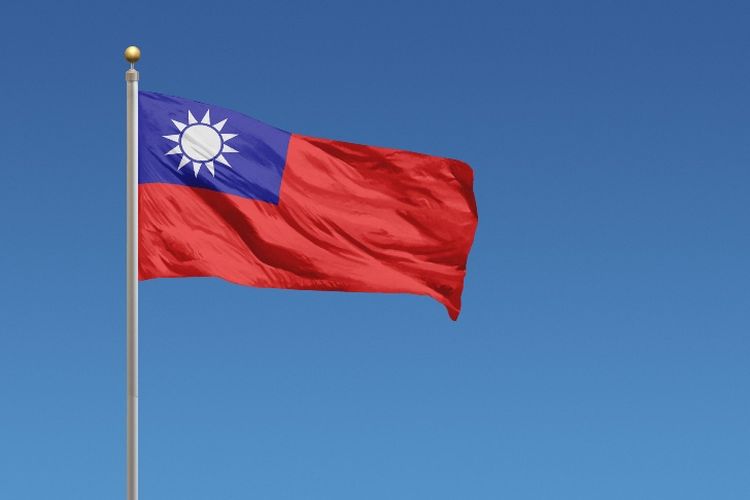 Taiwan flag.-In 1971, the United Nations transferred diplomatic recognition to Beijing and the Taiwanese government was forced out.
Taiwan flag.-In 1971, the United Nations transferred diplomatic recognition to Beijing and the Taiwanese government was forced out.
In 1978 China began to open its economy to the world. The US, which looked at trade opportunities and the need to develop relations, officially established diplomatic relations with Beijing in 1979.
Since then the number of countries that have recognized the Government of the Republic of China or Taiwan diplomatically has fallen drastically to around 15 countries.
Now, despite having all the requirements of an independent state and a different political system from China, Taiwan’s legal status remains unclear.
Read also: The End of the Chinese Civil War and the History of the Founding of Taiwan
3. The reason why China and Taiwan are hostile in terms of relations
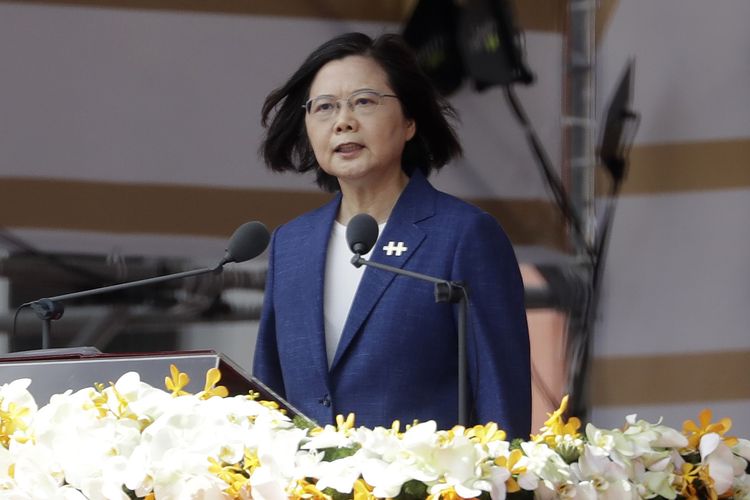 Taiwan’s President Tsai Ing-wen speaks during a National Day celebration in front of the Presidential Building, Taipei, Sunday (10/10/2021).-Relations between the two countries began to improve in the 1980s when Taiwan relaxed rules on visits and investments in China. In 1991, Taiwan declared that the war with the People’s Republic of China (PRC) was over.
Taiwan’s President Tsai Ing-wen speaks during a National Day celebration in front of the Presidential Building, Taipei, Sunday (10/10/2021).-Relations between the two countries began to improve in the 1980s when Taiwan relaxed rules on visits and investments in China. In 1991, Taiwan declared that the war with the People’s Republic of China (PRC) was over.
China once proposed a “one country, two systems” option, which it said would allow Taiwan significant autonomy if it agreed to come under Beijing’s control. This system succeeded in returning Hong Kong to China in 1997.
However, Taiwan rejected the offer and China insisted that Taiwan’s ROC Government was illegitimate.
In 2000, Taiwan elected Chen Shui-bian as president which worried Beijing. Chen and his party, the Democratic Progressive Party (DPP), openly support “independence”.
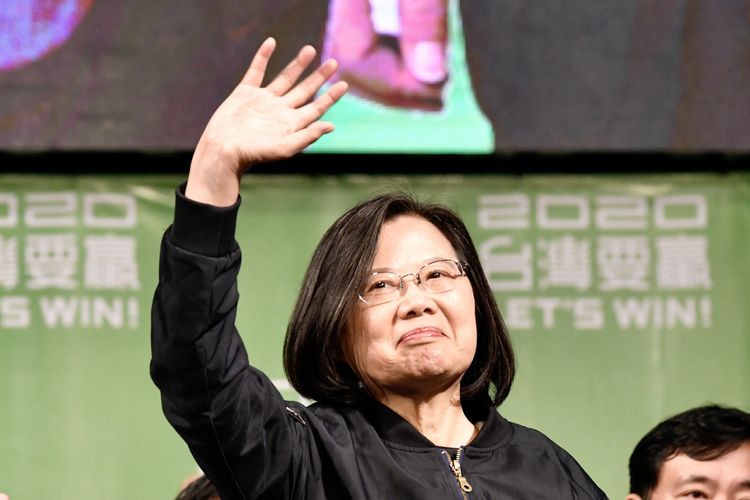 Taiwan’s President Tsai Ing-wen greets supporters at the Democratic Progressive Party headquarters in Taipei, after being declared victorious in the elections that took place Saturday, January 11, 2020. Tsai won in her second term defeating Kuomintang candidate who is known to be close to China, Han Kuo-yu.-A year after Chen Shui-bian was re-elected in 2004, China passed an anti-separation law, which states China’s right to use “non-peaceful means” against Taiwan if it tries to secede from China.
Taiwan’s President Tsai Ing-wen greets supporters at the Democratic Progressive Party headquarters in Taipei, after being declared victorious in the elections that took place Saturday, January 11, 2020. Tsai won in her second term defeating Kuomintang candidate who is known to be close to China, Han Kuo-yu.-A year after Chen Shui-bian was re-elected in 2004, China passed an anti-separation law, which states China’s right to use “non-peaceful means” against Taiwan if it tries to secede from China.
Chen Shui-bian was replaced by Ma Ying-jeou of KMT in 2008 who tried to improve relations through economic agreements.
Eight years later, in 2016, Taiwan’s current president Tsai Ing-wen was elected, who now leads the DPP and is leaning towards independence.
Relations soured further in 2018 when Beijing stepped up pressure on international companies. If they don’t list Taiwan as part of China on their website, China threatens to block it from doing business in “Land of Pandas”.
Read also: History Why China is Called China in Indonesia
In 2020 Tsai Ing-wen won a second term with a record-breaking 8.2 million votes.
This acquisition is seen as an insult to Beijing, making it another reason why China and Taiwan are at loggerheads.
Get updates featured news and breaking news every day from Kompas.com. Let’s join the Telegram group “Kompas.com News Update”, how to click the link https://t.me/kompascomupdate, then join. You must first install the Telegram application on your cellphone.–
/data/photo/2022/06/28/62bafa536f2ad.jpg)
